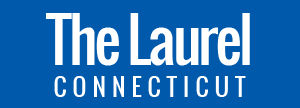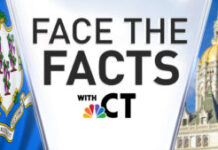Face the State WFSB 11 a.m.
Host: Dennis House
The Debate over the Electoral College: Rep. James Spallone (D-Essex) and Rep. David Labriola (R-Naugatuck) discuss the effort to pass the “National Popular Vote” bill at the Connecticut legislature.
Plainville Republican Justin Bernier who plans to challenge 5th District Congressman Chris Murphy
Dr. Riccardo Ambrogio, former vice counsel to the Italian government, on relief efforts for earthquake victims
The Real Story Fox61 8:30 am/ CW20 WTXX-TV 11 am
Host: Shelly Sindland
Secretary of the State Susan Bysiewicz on her possible run for the Democratic nomination for Governor
Decriminalizing Marijuana, with Dominic Vita, an Iraqi War Veteran in favor of the idea, and Cornell Lewis, a Hartford Activist who has an interesting take on the proposed legislation.
“Walk like M.A.D.D” on May 3 to raise awareness of the dangers of drunk driving. Guests: Mayor Scott Slifka, (D) West Hartford and Debbie Mele Warren whose daughter was killed by a drunk driver
CT Newsmakers WVIT/NBC30 6:30 am
Host: Tom Monahan
Focus on Connecticut News12 Saturday: 7:30 am, 11 am, 2:30 pm, 7:30 pm.Sunday: 2:30 am, 7:30 am, 11 am, 1:30 pm, 5:30 pm
Host: Tom Appleby
State Senator John McKinney ® Fairfield
State Senator Andrew McDonald (D) Stamford
On the Record CPTV Friday at 8:30 pm, Sunday at 10 am, Monday at 11:30
Available for online viewing Friday at 2pm cptv.org
Host: Steve Kotchko
Mayor Dan Malloy (D-Stamford) who is seeking the Democratic nomination for Governor





The major shortcoming of the current system of electing the President is that presidential candidates concentrate their attention on a handful of closely divided “battleground” states. Connecticut is not one. 98% of the 2008 campaign events involving a presidential or vice-presidential candidate occurred in just 15 closely divided “battleground” states. Over half (57%) of the events were in just four states (Ohio, Florida, Pennsylvania and Virginia). Similarly, 98% of ad spending took place in these 15 “battleground” states. Similarly, in 2004, candidates concentrated over two-thirds of their money and campaign visits in five states and over 99% of their money in 16 states.
Two-thirds of the states and people have been merely spectators to the presidential elections. Candidates have no reason to poll, visit, advertise, organize, campaign, or worry about the voter concerns in states where they are safely ahead or hopelessly behind. The reason for this is the winner-take-all rule enacted by 48 states, under which all of a state’s electoral votes are awarded to the candidate who gets the most votes in each separate state.
Another shortcoming of the current system is that a candidate can win the Presidency without winning the most popular votes nationwide. This has occurred in one of every 14 presidential elections.
In the past six decades, there have been six presidential elections in which a shift of a relatively small number of votes in one or two states would have elected (and, of course, in 2000, did elect) a presidential candidate who lost the popular vote nationwide.
The National Popular Vote bill would guarantee the Presidency to the candidate who receives the most popular votes in all 50 states (and DC).
Every vote would be politically relevant and equal in presidential elections.
The bill would take effect only when enacted, in identical form, by states possessing a majority of the electoral votes–that is, enough electoral votes to elect a President (270 of 538). When the bill comes into effect, all the electoral votes from those states would be awarded to the presidential candidate who receives the most popular votes in all 50 states (and DC).
The Constitution gives every state the power to allocate its electoral votes for president, as well as to change state law on how those votes are awarded.
The bill is currently endorsed by 1,659 state legislators — 763 sponsors (in 48 states) and an additional 896 legislators who have cast recorded votes in favor of the bill.
In Gallup polls since 1944, only about 20% of the public has supported the current system of awarding all of a state’s electoral votes to the presidential candidate who receives the most votes in each separate state (with about 70% opposed and about 10% undecided). The recent Washington Post, Kaiser Family Foundation, and Harvard University poll shows 72% support for direct nationwide election of the President. This national result is similar to recent polls in closely divided battleground states: Colorado– 68%, Iowa –75%, Michigan– 73%, Missouri– 70%, New Hampshire– 69%, Nevada– 72%, New Mexico– 76%, North Carolina– 74%, Ohio– 70%, Pennsylvania — 78%, Virginia — 74%, and Wisconsin — 71%; in smaller states (3 to 5 electoral votes): Delaware –75%, Maine — 71%, Nebraska — 74%, New Hampshire –69%, Nevada — 72%, New Mexico — 76%, Rhode Island — 74%, and Vermont — 75%; in Southern and border states: Arkansas –80%, Kentucky — 80%, Mississippi –77%, Missouri — 70%, North Carolina — 74%, and Virginia — 74%; and in other states polled: California — 70%, Connecticut — 73% , Massachusetts — 73%, New York — 79%, and Washington — 77%.
The National Popular Vote bill has passed 27 state legislative chambers, including one house in Arkansas, Maine, Michigan, Nevada, New Mexico, North Carolina, and Oregon, and both houses in California, Colorado, Hawaii, Illinois, New Jersey, Maryland, Massachusetts, Rhode Island,, Vermont, and Washington. The bill has been enacted by Hawaii, Illinois, New Jersey, and Maryland. These four states possess 50 electoral votes — 19% of the 270 necessary to bring the law into effect.
See http://www.NationalPopularVote.com
73% OF CONNECTICUT VOTERS SUPPORT A NATIONAL POPULAR VOTE FOR PRESIDENT IN APRIL 2008 POLL
A survey of 797 Connecticut voters conducted April 19-20, 2008 showed 73%-27% support for a national popular vote for President.
By party, support for a national popular vote for President is 80%-20% among Democratic voters; 59%-41% among Republicans, and 76%-24% for Others.
By age, support is 76%-24% among 18-29 year olds; 67%-33% among 30-45 year olds; 72%-28% among 46-65 year olds; and 78%-22% among 65-and-older.
By gender, support is 81%-19% among women and 64%-36% among men.
By race, support is 73%-27% among whites, 71%-29% among African-Americans, 79%-21% among Hispanics, and 66%-34% among Others.
see http://www.NationalPopularVote.com